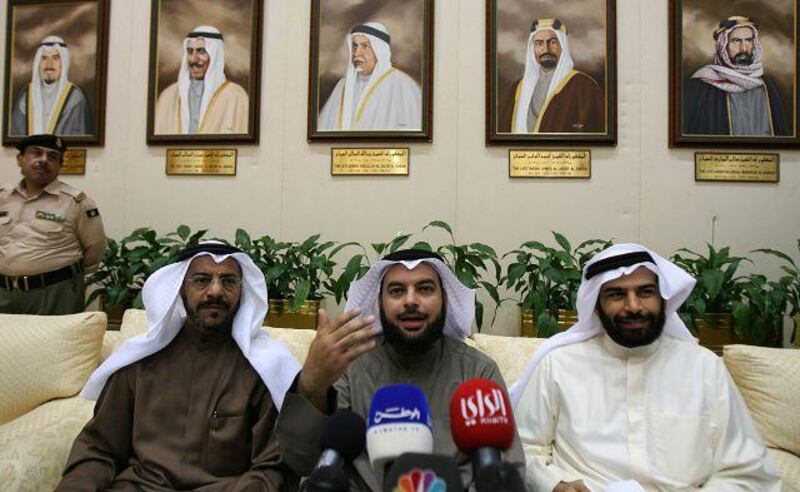KUWAIT CITY // Kuwait's national assembly is facing another crisis. Two separate applications by MPs last week to question the prime minister in parliament have sparked rumours that it will be suspended. Although the move would be constitutional as long as elections are called within 60 days, it would only delay - not resolve - confrontation in Kuwait's assembly. Even though MPs have the constitutional right to question any member of the cabinet, the royal family will not allow the honour of a potential future emir to be slighted in a public scolding. To prevent this embarrassment, the cabinet has in the past resigned or the emir has suspended the parliament. But the problem keeps coming back.
If parliament is dissolved, it will be the third time requests to grill the current prime minister, Sheikh Nasser Al Ahmad Al Sabah, have lead to political deadlock since his tenure began in Feb 2006. Each crisis has delayed laws to develop the emirate, and this time the economy is especially vulnerable. Kuwaiti companies are currently waiting for MPs to pass a financial rescue package. Without it, many companies in the country's troubled investment sector could fail, and the economic crisis could spread.
Kuwait used to spearhead development in the Gulf. In the 1970s, there were more cars per person in the emirate than in any other country in the world. Now it watches other states flourish as it stumbles from one standstill to the next. By easing ownership laws and bureaucratic procedures, Kuwait's neighbours have lured in foreign companies. Qatar, which has less than one-third of Kuwait's population, has 10 times as much foreign direct investment. Other GCC states have even more.
While Abu Dhabi and Dubai have diversified their economies with airlines, tourism and real estate; Kuwait's lack of reform has left it heavily dependent on oil. Energy sales in the UAE now account for a quarter of its gross domestic product. In Kuwait, the figure is closer to half. Some Kuwaitis say they hope elections after the dissolution of parliament will usher in more co-operative lawmakers, or the emir will use the break to name a prime minister who could reconcile the ministers with the MPs. But both solutions will not guarantee long-term stability because they fail to address the main cause of friction.
Kuwait's political system encourages confrontation. MPs, many of whom are elected by tribal or sectarian groups, are overlooked when the cabinet is selected. The prime minister prefers royals or experts who are loyal to the family. Because parties are outlawed, MPs operate independently or in small, quasi-legal groups. With no factional ties to the government and little chance of being involved, they adopt populist policies that would put the ministries' budgets under serious strain. Threatening to grill members of the cabinet is a useful way to push their agendas, and quizzing the prime minister is their ultimate weapon.
Confrontation between the parliament and government has become the assembly's Gordian knot. Alexander the Great's solution was to slice it open with his sword, and the prime minister could learn from that bold approach - he must face the MPs' questions. The only other ways to avert crises are by changing the constitution or closing the parliament indefinitely. Both are anathema to most Kuwaitis. Because any disgruntled MP has the right to question any member of the cabinet, requests to quiz the prime minister will always be on the horizon.The current requests concern issues such as expenses in the prime minister's diwan and the collapse of Kuwait Petroleum Corp's deal with Dow.
By standing up to the MPs' questions, the prime minister will be able to fight the government's case and put a stop to parliament's debilitating closures. He would have plenty of ammunition to fight back. It is the MPs' overzealous interference that has earned Kuwait the reputation of a nanny state, and many Kuwaitis believe they use their positions and connections for personal gain. Kuwait has come a long way in its search for democratic institutions that can sit comfortably with the country's traditional heritage, and they are on the brink of making it work. The prime minister will facilitate this process with increased participation in the National Assembly.
Leading members of the royal family may be concerned that a public grilling could damage their reputations, but avoiding the interpolations will not benefit them either. A showdown with MPs could give them the platform to display their leadership skills to the country. "Honour lies in honest toil," said Grover Cleveland, a former president of the United States. There's no better place for the prime minister to toil than in the parliament. jcalderwood@thenational.ae





